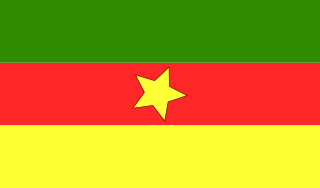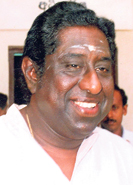
The Liberation Tigers of Tamil Eelam was a Tamil militant organization that was based in the northern and eastern Sri Lanka. The LTTE fought to create an independent Tamil state called Tamil Eelam in the northeast of the island in response to violent persecution and discriminatory policies against Sri Lankan Tamils by the Sinhalese-dominated Sri Lankan Government.
Tamil Makkal Viduthalai Pulikal (TMVP), previously known as the "Karuna Group", is a political party in Sri Lanka. It was formed by Karuna Amman, a former leader of the Liberation Tigers of Tamil Eelam, after he defected from the organization in 2004. Initially a paramilitary group that helped the Sri Lankan Government fight the Tamil Tigers, the TMVP was registered as a political party in 2007. Under deputy leader Pillayan, they contested their first provincial elections in 2008, winning a majority in the Eastern Provincial Council. Members of the TMVP continue to carry arms under the auspices of the Sri Lankan government, which they claim is for their own safety from the Tamil Tigers, who carry out repeated attacks against them. The group is believed to be working with the Sri Lankan Army. They have been accused of human rights violation by local and international human rights organization.
Rajani Thiranagama was a Sri Lankan Tamil human rights activist and feminist who was assassinated by LTTE cadres after she had criticised them for their atrocities. At the time of her assassination, she was the head of the Department of Anatomy at the University of Jaffna and an active member of University Teachers for Human Rights, Jaffna, and was one of its founding members.

The Eelam People's Democratic Party (EPDP) is a political party and a pro-government paramilitary organization in Sri Lanka. It is led by its founder Douglas Devananda.
Ilayathamby Tharsini was a minority Sri Lankan Tamil woman who was raped and killed in her home town of Pungudutheevu on December 16, 2005.
The Nager Kovil school bombing refers to an airstrike that took place on September 22, 1995, when the Sri Lankan Air Force bombed the Nagar Kovil Maha Vidyalayam school in Jaffna, resulting in the death of, by varying accounts, 34-71 Sri Lankan Tamil civilians, primarily schoolchildren and the injury of many more. Sri Lankan Defense Spokesman admitted the incident but claimed that it was a LTTE facility and most of the dead were LTTE cadres. Journalists and human rights organizations reported the imposition of censorship and the airstrike took place about 12 hours after the Government imposed press censorship on reporting military events.
Kethesh Loganathan was a Sri Lankan Tamil political activist, a Human Rights advocate and deputy secretary general of the Secretariat for Coordinating the Peace Process (SCOPP). He was among the fiercest critics of the separatist Liberation Tigers of Tamil Eelam (LTTE), which was widely blamed for his death. The group has neither accepted nor denied responsibility for his assassination.
Michael Richard Ratnarajan Hoole is a Sri Lankan Tamil mathematician, academic and human rights activist. He was one of the founders of University Teachers for Human Rights (UTHR) which documented human rights abuses during the Sri Lankan Civil War.

Nadarajah Raviraj was a Sri Lankan Tamil lawyer and politician who served as Mayor of Jaffna in 2001 and a Member of Parliament for Jaffna District from 2001 to 2006. A member of the Tamil National Alliance, he was shot dead on 10 November 2006 in Colombo.

Gaasinather Gangaser Ponnambalam was a Sri Lankan lawyer and politician. Leader of the All Ceylon Tamil Congress, he was a presidential candidate in 1982. He was shot dead in January 2000 in an assassination many suspect to be ordered by President Chandrika Kumaratunga.
The Kent and Dollar Farm massacres were the first massacres of Sinhalese civilians carried out by the LTTE during the Sri Lankan Civil War. The massacres took place on 30 November 1984, in two tiny farming villages in the Mullaitivu district in north-eastern Sri Lanka. The Sri Lankan government labeled this as an attack on civilians by the LTTE.
The Kalmunai massacre refers to a series of mass killings that occurred in June 1990 in Kalmunai, a municipality within the Ampara District of Sri Lanka's Eastern Province. The massacre of Tamil civilians was allegedly carried out by the Sri Lankan Army in retaliation for an earlier massacre of Sri Lankan police officers. The University Teachers for Human Rights, a human rights organization, put the number of dead in the second massacre at 250, while a local Member of Parliament claimed that at least 160 people were killed.
Eelam War I is the name given to the initial phase of the armed conflict between the government of Sri Lanka and the LTTE.

Eelam War II is the name given to the second phase of armed conflict between Sri Lankan military and the separatist Liberation Tigers of Tamil Eelam. The war started after the failure of peace talks between the Premadasa government and the LTTE. This phase of the war was initiated by the LTTE who massacred almost 600 Sinhalese and Muslim police personnel after they were ordered by the Premadasa government to surrender to the LTTE. The truce was broken on June 10, 1990 when the LTTE in October expelled all the 28,000 Muslims residing in Jaffna.
2006 murder of TRO workers refers to the incident of abduction of seven Tamils Rehabilitation Organisation (TRO) employees who were tortured and executed by the TMVP paramilitary group. One employee Premini Thanuskodi was gang raped and murdered.

The 1987 Eastern Province massacres were a series of massacres of the Sinhalese population in the Eastern Province of Sri Lanka by Tamil mobs and Liberation Tigers of Tamil Eelam (LTTE) during the Sri Lankan Civil War. Though they began spontaneously, they became more organized, with the LTTE leading the violence. Over 200 Sinhalese were killed by mob and militant violence, and over 20,000 fled the Eastern Province. The violence has been described as having had the appearance of a pogrom.
Sexual violence against Tamils in Sri Lanka has occurred repeatedly during the island's long ethnic conflict. The first instances of rape of Tamil women by Sinhalese mobs were documented during the 1958 anti-Tamil pogrom. This continued in the 1960s with the deployment of the Sri Lankan Army in Jaffna, who were reported to have molested and occasionally raped Tamil women.





